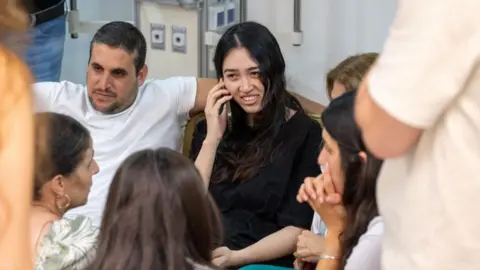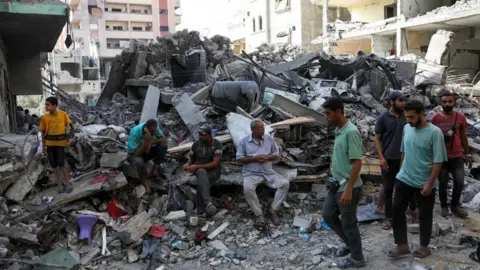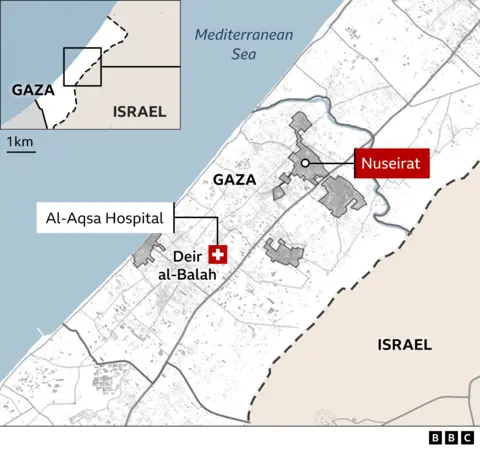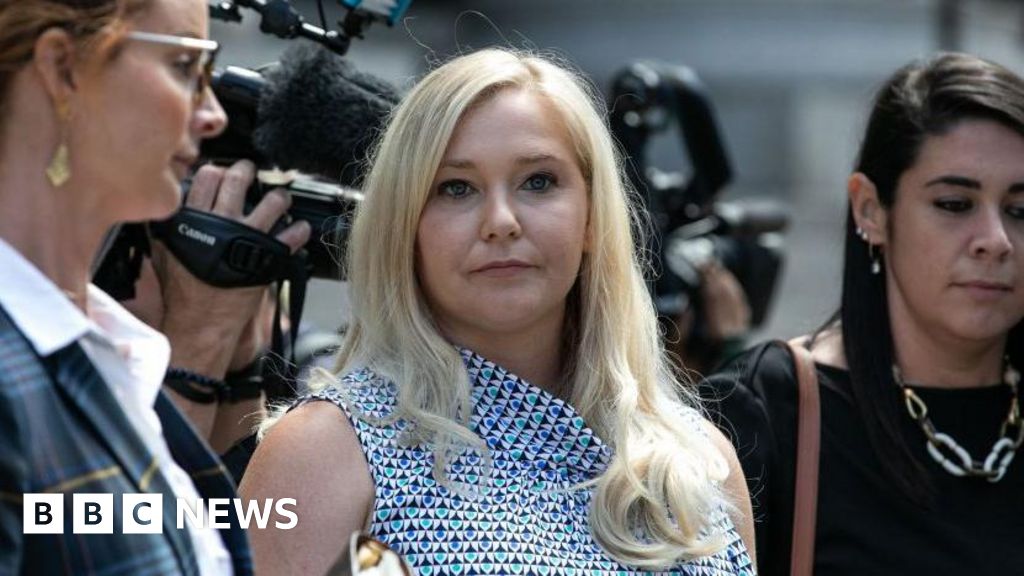ARTICLE AD BOX
56 minutes ago
By Jon Donnison, BBC News
Grief in Gaza as scores killed in IDF hostage raid
Two days after Israel's operation to free four of its citizens from central Gaza, more details are emerging of how Saturday’s rescue mission unfolded and of the hostages' eight months in captivity.
The Hamas run Health Ministry says at least 274 Palestinians were killed and almost 700 injured in the assault.
Israeli special forces freed female hostage Noa Argamani using the element of surprise - but another team which had freed three male hostages came under attack prompting the Israeli military to launch massive air strikes on crowded nearby streets as covering fire, killing scores of Palestinians.
After weeks of meticulous planning and acting on intelligence, the green light for the operation dubbed Seeds of Summer was given by Israel’s war cabinet last Thursday evening.
Around 10:00 local time on Saturday morning and in broad daylight, two teams of Israeli special forces, some disguised as Palestinians, crossed into Gaza. It’s thought they were travelling in at least one truck and in civilian cars.
The streets of the densely populated Nuseirat refugee camp were busy with people shopping in a nearby market.
The targets were two residential apartments a few hundred meters apart.
Eyewitness Isaam Jameel Arouqi told the BBC some of the Israeli soldiers came from a truck full of furniture.
He said there were two in civilian clothes and around 10 in masks and military uniforms.
“Suddenly, special forces came out of it and started shooting,” he said.
Speaking from hospital, Mr Arouqi says he was shot three times in the chest and stomach.
There are reports of a second truck with mattresses on top from which a second team emerged, possibly using a ladder to get into one apartment.
The Israel Defense Forces (IDF) says the operation to free 25-year-old Noa Argamani went smoothly as special forces took her captors by surprise, and quickly killed the guards.
Israel’s Channel 12 television, which has spoken to Miss Argamani's family, says the young woman told them she had been asked to wash the dishes on the morning of the raid.
According to Channel 12, she suddenly saw the Israeli soldiers with masked faces who said “Noa it’s the IDF”.
One solider asked if he could pick her up over his shoulder.
Only then did she realise what was happening.
After being transported by car she was then flown out of Gaza by helicopter.
Her 246-day ordeal was over.

 Reuters
Reuters
Noa Argameni was held in Gaza for 246 days
The IDF says the simultaneous operation to free Shlomi Ziv, 40, Andrey Kozlov, 27, and Almog Meir, 21 from the second apartment was more challenging as by this time the element of surprise had been lost.
More is known about the family who the Israeli military says were holding the three men.
Ramy Abdu, the chairman of the Euro-Med Human Rights Monitor organisation, said initial evidence showed the Israeli special forces used a ladder to enter the family home of Dr Ahmed Al-Jamal.
His 36-year-old, son Abdullah al Jamal is a one-time freelance journalist who had also worked for Hamas as a spokesperson.
The special forces shot Ahmed and Abdullah dead along with several members of their family, Mr Abdu said.
The IDF’s Chief Spokesperson Rear Admiral Daniel Hagari who was able to watch and listen to the operation unfold live via video link says the code name for the hostages was "diamonds".
He described hearing with relief the words "the diamonds are in our hands", signalling the three hostages had been freed.
But it was getting the three male hostages out of Gaza where things began to go wrong.
By now the IDF says their forces were coming under heavy fire from Palestinian fighters.
It’s reported that at least one of the vehicles that they were leaving in broke down.
The Israeli military decided to send in more support, attacking from the air, from the sea and on the ground with massive force.
Mobile phone video from the scene shows people diving for cover as missiles whistled in and gunfire rang out.
Later footage showed bodies strewn in the street.
It was in these moments that so many Palestinians are likely to have died.
"Many people were in the streets, scared and running away. It was as if it were Judgment Day. No one knew where to go," Mohammed Mahmoud Hamed told the BBC.
"There were many people killed, so many that we couldn't even get to them. They couldn't rescue or retrieve the bodies, especially those who were wounded. People were scared to go rescue them because of the intense shooting and bombing," he said.

 Reuters
Reuters
The Israeli military said it launched "dozens" of air strikes during the raid on Nuseirat
The Israeli military said aircraft "struck dozens of military targets for the success of the operation".
The two hospitals in central Gaza, al-Aqsa Martyrs' hospital in Deir al-Balah and al-Awda, a facility in Nuseirat, were already at breaking point and were quickly overwhelmed with bloodied casualties including many children laid out in the corridors.
At al-Awda sitting at the bedside of his young daughter, her head bandaged, was Mohamed al Assar.
"Two of my daughters were killed and the rest were wounded," he said.
"My wife, my daughter Raghad, my daughter Reem, Minnah, Jannah, all of them were wounded and two were martyred, may their souls rest in peace."
Sam Rose the Director of Planning at Unrwa, the UN agency for Palestinians, said many of his staff in the camp were caught up in the assault.
"We had scores of staff literally hiding under the stairs for several hours as helicopters, tanks, naval shells, as troops on the ground fought intensely in the surrounding areas," Mr Rose said.
Reunions after four Israeli hostages freed in IDF raid
There have also been some details of the conditions the four Israeli hostages were kept in.
The IDF said they were in locked rooms and not in cages.
Channel 12 television says Noa Argamani has told her family she was moved between several different apartments during eight months of captivity but was not held in tunnels.
She recounted thinking she was going to die on a number of occasions, including once when a missile was fired into a building where she was staying.
Ms Argamani said she was given food but not enough and that she was rarely allowed to go outside for fresh air and only when disguised as a Palestinian woman. She was also allowed to shower on a handful of occasions.
The freeing of the four hostages has been celebrated in Israel with relief and praise for the military operation.
But in Gaza there is outrage at the number of dead and wounded that the Israelis left in their wake on one of the bloodiest days of the war so far.



 10 months ago
25
10 months ago
25








 English (US) ·
English (US) ·